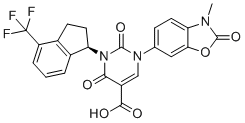
Fulacimstat
CAS No. 1488354-15-9
Fulacimstat( BAY 1142524 | BAY1142524 | BAY-1142524 )
Catalog No. M12057 CAS No. 1488354-15-9
Fulacimstat (BAY 1142524, BAY1142524) is a potent, orally available chymase inhibitor with IC50 of 4 nM and 3 nM for human and hamster chymase enzyme, respectively.
Purity : >98% (HPLC)
 COA
COA
 Datasheet
Datasheet
 HNMR
HNMR
 HPLC
HPLC
 MSDS
MSDS
 Handing Instructions
Handing Instructions
| Size | Price / USD | Stock | Quantity |
| 5MG | 260 | Get Quote |


|
| 10MG | 372 | Get Quote |


|
| 25MG | 623 | Get Quote |


|
| 50MG | 887 | Get Quote |


|
| 100MG | 1197 | Get Quote |


|
| 200MG | Get Quote | Get Quote |


|
| 500MG | Get Quote | Get Quote |


|
| 1G | Get Quote | Get Quote |


|
Biological Information
-
Product NameFulacimstat
-
NoteResearch use only, not for human use.
-
Brief DescriptionFulacimstat (BAY 1142524, BAY1142524) is a potent, orally available chymase inhibitor with IC50 of 4 nM and 3 nM for human and hamster chymase enzyme, respectively.
-
DescriptionFulacimstat (BAY 1142524, BAY1142524) is a potent, orally available chymase inhibitor with IC50 of 4 nM and 3 nM for human and hamster chymase enzyme, respectively; blocks the generation of profibrotic chymase-dependent factors such as Ang II, ET-1, and TGF-β1 in vitro with a nanomolar IC50; reduces isoprenaline-induced cardiac fibrosis and attenuates the deterioration of heart function after MI, increases left-ventricular ejection fraction in dogs with LVD induced by intracoronary microembolization with no effects on blood pressure or heart rate. Other Indication Phase 2 Clinical(In Vitro):Fulacimstat inhibits human and hamster chymase enzyme with IC50s of 4 nM and 3 nM, respectively.(In Vivo):Isoprenaline induces cardiac fibrosis (24.4±1.8%) in hamsters, which is reduced dose dependently by Fulacimstat (16.4±1.2%, 12.4 ± 1.3%, 10.9±1.4% at 1, 3 and 10 mg/kg respectively) and by enalapril (17.7±1.5% at 20 mg/kg). Four weeks after MI, hamster hearts show an increased end diastolic pressure, and reduce contractility and relaxation. Compared to placebo (19.3±2 mmHg), Fulacimstat at 10 mg/kg reduce significantly the end diastolic pressure (13.2±1.4 mmHg) without any effects on blood pressure or heart rate. Moreover, treatment with Fulacimstat reduce the fibrotic area and improve the cardiac response to adrenergic stimulation.
-
In VitroFulacimstat inhibits human and hamster chymase enzyme with IC50s of 4 nM and 3 nM, respectively.
-
In VivoIsoprenaline induces cardiac fibrosis (24.4±1.8%) in hamsters, which is reduced dose dependently by Fulacimstat (16.4±1.2%, 12.4 ± 1.3%, 10.9±1.4% at 1, 3 and 10 mg/kg respectively) and by enalapril (17.7±1.5% at 20 mg/kg). Four weeks after MI, hamster hearts show an increased end diastolic pressure, and reduce contractility and relaxation. Compared to placebo (19.3±2 mmHg), Fulacimstat at 10 mg/kg reduce significantly the end diastolic pressure (13.2±1.4 mmHg) without any effects on blood pressure or heart rate. Moreover, treatment with Fulacimstat reduce the fibrotic area and improve the cardiac response to adrenergic stimulation.
-
SynonymsBAY 1142524 | BAY1142524 | BAY-1142524
-
PathwayOthers
-
TargetOther Targets
-
RecptorOther Targets
-
Research AreaOther Indications
-
IndicationOther Disease
Chemical Information
-
CAS Number1488354-15-9
-
Formula Weight487.39
-
Molecular FormulaC23H16F3N3O6
-
Purity>98% (HPLC)
-
SolubilityDMSO : 5 mg/mL 10.26 mM
-
SMILESO=C(C1=CN(C2=CC=C3N(C)C(OC3=C2)=O)C(N([C@@H]4CCC5=C4C=CC=C5C(F)(F)F)C1=O)=O)O
-
Chemical Name1-(3-methyl-2-oxo-1,3-benzoxazol-6-yl)-2,4-dioxo-3-[(1R)-4-(trifluoromethyl)-2,3-dihydro-1H-inden-1-yl]pyrimidine-5-carboxylic acid
Shipping & Storage Information
-
Storage(-20℃)
-
ShippingWith Ice Pack
-
Stability≥ 2 years
Reference
1.?Kanefendt F, et al. Clin Pharmacol Drug Dev. 2018 Jun 7. doi: 10.1002/cpdd.579.
2.?Hanna Tinel, et al. Abstract 13624: A Novel Chymase Inhibitor BAY 1142524 Reduces Fibrosis and Improves Cardiac Function After Myocardial Infarction in Hamster. Circulation. 2017;136:A13624.
molnova catalog



related products
-
4-Hydroxybenzoic aci...
4-Hydroxybenzoic acid is a monohydroxybenzoic acid, a phenolic derivative of benzoic acid. It is a white crystalline solid that is slightly soluble in water and chloroform but more soluble in polar organic solvents such as alcohols and acetone.
-
Ascr#2
Ascr#2 (asc-C6-MK) is a glycoside analogue in Cryptococcus hidradii that promotes dauer formation.Ascr#2 mixtures with ascr#3 at low concentrations act as a male elicitor and can be used to detect population density.
-
LKRApYLG-NH2
LKRApYLG-NH2



 Cart
Cart
 sales@molnova.com
sales@molnova.com


